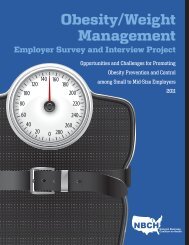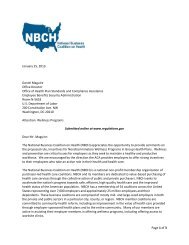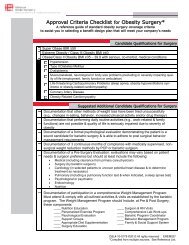Lincoln Industries' Wellness Program - National Business Coalition ...
Lincoln Industries' Wellness Program - National Business Coalition ...
Lincoln Industries' Wellness Program - National Business Coalition ...
You also want an ePaper? Increase the reach of your titles
YUMPU automatically turns print PDFs into web optimized ePapers that Google loves.
context of a self-insured plan that has steadily reduced claim costs, reaching a low mod rate<br />
and requiring lower reserves than historically. Nearly 72% of the total savings are generated<br />
in health care cost—but other components also produce substantial savings:<br />
• Tobacco use in the employee population is down radically. Yet between new hires and the<br />
expectation that all smokers are encouraged to quit, nine employees successfully used the<br />
smoking cessation program in 2011, yielding a projected $4,800 in savings per participant.<br />
• Other intervention programs generate substantial cost reduction by changing health<br />
behavior, managing chronic diseases, and flu vaccination—very close in total savings to the<br />
absenteeism component.<br />
• Absenteeism savings are calculated in relation to the national average rate of 5%<br />
unplanned absence, estimated by the Society of Human Resource Management. <strong>Lincoln</strong><br />
Industries, with a rate of 3%, saves nearly $1,200 per employee at their average hourly cost<br />
of $19.93 in 2011.<br />
• Reduced turnover cost is calculated as 5% of total turnover cost for the year, on the<br />
assumption that wellness reduces turnover by 5%.<br />
The <strong>Wellness</strong> <strong>Program</strong> correlates wellness and productivity inside the organization, and<br />
compares its wellness culture to regional and national benchmarks. Measures of wellness and<br />
productivity include: participation in programs (reported at supervisor level), health<br />
outcomes as measured by prevalence of metabolic syndrome, and survey data from the Well-<br />
Being Assessment plus <strong>Lincoln</strong> Industries’ own internal opinion survey which measures<br />
culture components related to the company’s Beliefs and Drivers. <strong>Lincoln</strong> Industries’ average<br />
Gallup-Healthways Well-Being Index Composite Score is 74.1, higher than the community<br />
score of 72.8 for <strong>Lincoln</strong>, Nebraska.<br />
Conclusion<br />
The <strong>Lincoln</strong> Industries <strong>Wellness</strong> <strong>Program</strong> is driven by strong upper-management support for<br />
employee wellness and satisfaction, but also has produced an ROI that can justify wellness<br />
investments in other organizations. The virtues of incremental program development are on<br />
full display in the <strong>Lincoln</strong> Industries story, where a culture of health has become a key driver<br />
in a successful high-performance manufacturing organization.









